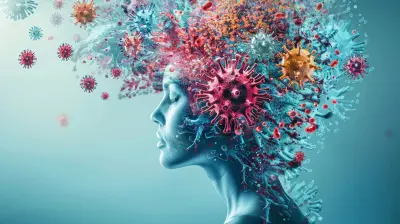Hormones and Weight Gain: What’s Really Happening in Your Body
6 December 2024
You’re eating the same things you’ve always eaten, maintaining your exercise routine, and suddenly your jeans feel tighter. What gives? Weight gain can feel like one big mystery sometimes, right? But here’s the kicker: your hormones might be the real culprits. Yep, those tiny chemical messengers in your body do more than you think. They’re not just bossing your mood around; they’re also pulling strings when it comes to your weight.
In this article, we’re going to break down the connection between hormones and weight gain. Why do those stubborn pounds creep up? And more importantly, what can you do about it? Let’s dive in and figure out what’s really going on inside your body. 
What Are Hormones, and Why Do They Matter?
Before we get into the nitty-gritty, let’s understand the basics. Hormones are like the body’s messengers. They’re produced by glands in your endocrine system, and their job is to deliver instructions to your tissues and organs. They regulate just about everything: sleep, mood, metabolism, and yes, even weight.Think of hormones as the steering wheel of a car. If they’re working smoothly, you’re cruising along. If they’re out of whack? Well, buckle up—it’s going to be a bumpy ride. 
The Hormones That Influence Your Weight
Let’s talk specifics. Not all hormones are involved in weight gain, but some notorious ones are repeat offenders. Here’s the lineup:1. Insulin: The Sugar Controller
Insulin is like the gatekeeper for your blood sugar. It’s produced by your pancreas and tells your cells to absorb glucose (sugar) for energy. But here’s the catch: if you eat too much sugar or refined carbs, insulin levels spike. Over time, this can lead to something called insulin resistance.When your cells stop responding to insulin properly, your body stores extra glucose as fat. The result? Weight gain, especially around your belly.
2. Cortisol: The Stress Hormone
Ever notice how you crave chocolate or chips after a stressful day? That’s cortisol doing its thing. This hormone is released when your body senses stress. While it’s great in small doses (like when you’re running late and need to hustle), chronic stress can keep cortisol levels elevated.High cortisol levels make your body hang onto fat as if it’s preparing for a famine. The fat usually piles up around your midsection because, apparently, cortisol thinks that’s a prime storage spot. Not cool, right?
3. Leptin: The Fullness Hormone
Leptin is your body’s way of saying, “Hey, you’ve had enough to eat!” It’s released by your fat cells and communicates with your brain to suppress hunger. Sounds great in theory, but here’s the twist: if you have too much body fat, your body can develop leptin resistance.This means your brain stops listening to leptin’s signals, and you feel hungry even when you’re full. It’s like being stuck in a broken feedback loop.
4. Ghrelin: The Hunger Gremlin
If leptin is the angel on your shoulder saying, “Don’t eat that donut,” ghrelin is the little devil whispering, “Go ahead, have two.” Ghrelin is produced in your stomach and increases your appetite.When you don’t get enough sleep or skip meals, ghrelin levels skyrocket. This makes you feel hungrier and more likely to overeat, leading to—you guessed it—weight gain.
5. Thyroid Hormones: The Metabolism Managers
Your thyroid gland produces hormones that regulate your metabolism. Think of these hormones—T3 and T4—as your body’s thermostat. When they’re in balance, they keep your metabolism humming along. But when they’re low (a condition called hypothyroidism), your metabolism slows down. This can make you gain weight even if you’re eating normally.
What Causes Hormonal Imbalances?
Okay, so now we know which hormones are involved. But what throws them off balance in the first place? Here are some common culprits:- Poor Diet: Too much sugar, processed foods, or unhealthy fats can wreak havoc on your hormones.
- Chronic Stress: Remember cortisol? Long-term stress keeps your cortisol levels high and can lead to hormonal chaos.
- Lack of Sleep: Sleep is like the reset button for your hormones. Skimping on it can mess with everything from ghrelin to insulin.
- Aging: Sorry, but as we age, our hormone levels naturally fluctuate. This is especially true for women going through menopause and men experiencing a drop in testosterone.
- Health Conditions: Disorders like polycystic ovary syndrome (PCOS), hypothyroidism, and diabetes can disrupt hormonal balance. 
How to Get Your Hormones Back on Track
Feeling overwhelmed? Don’t worry—there’s plenty you can do to nudge your hormones back into balance. Here’s how:1. Eat a Balanced Diet
If food is fuel, then think of your body as a high-performance machine. Feed it well! Include plenty of whole foods like vegetables, fruits, lean proteins, healthy fats, and whole grains. Avoid the sugary, processed stuff as much as possible.Foods rich in omega-3 fatty acids (like salmon and walnuts) can help reduce inflammation and support hormonal health. Cruciferous veggies (think broccoli and cauliflower) can even help metabolize excess estrogen.
2. Manage Stress
Easier said than done, right? But reducing stress can work wonders for your hormones. Try meditation, yoga, or even just taking a walk in nature. Journaling or talking to a friend can also help you decompress.3. Prioritize Sleep
Sleep isn’t just about feeling rested; it’s a hormonal reset. Aim for 7–9 hours a night, and try to keep a consistent sleep schedule. Ditch the screens an hour before bedtime to help your body wind down.4. Get Moving
Exercise doesn’t just burn calories; it also improves hormonal balance. Strength training can help build muscle (which burns more calories) and improve insulin sensitivity. Cardio can reduce cortisol levels. A mix of both is a winning combo.5. Stay Hydrated
Dehydration can throw your hormones off balance. Make water your go-to beverage throughout the day. Add a slice of lemon or cucumber if plain water doesn’t excite you.6. Seek Medical Advice
If you suspect a hormonal imbalance, don’t play the guessing game. A medical professional can run tests and provide targeted treatments or therapies. Sometimes, all it takes is a prescribed tweak to get your hormones back in line.Final Thoughts: Small Changes, Big Impact
Hormones might sound complicated, but the solutions don’t have to be. By making simple, sustainable lifestyle changes—like eating better, sleeping more, and managing stress—you can help your body find its balance again.So, the next time the scale doesn’t budge despite your best efforts, don’t freak out. Take a deep breath and ask yourself: could it be my hormones? After all, these tiny chemical messengers have a huge impact on how we look and feel. Understanding what’s going on inside your body is the first step to taking control.
all images in this post were generated using AI tools
Category:
Hormonal BalanceAuthor:

Jackson Mahoney
Discussion
rate this article
13 comments
Mira Rocha
Great article! It's so enlightening to understand how hormones impact weight gain. It’s a reminder that our bodies are intricate systems. Thanks for breaking it down in such an easy-to-understand way!
April 3, 2025 at 3:55 PM

Jackson Mahoney
Thank you for your kind words! I'm glad you found the article enlightening and easy to understand. Hormones truly play a crucial role in our body's complexities!
Annette McGivern
Understanding the intricate dance of hormones in weight regulation reveals not just biological complexity, but also the profound impact of lifestyle choices and emotional well-being on our personal health journey. Balance is key.
March 29, 2025 at 5:07 PM

Jackson Mahoney
Thank you for your insightful comment! You're absolutely right—hormonal balance is crucial, and lifestyle choices play a significant role in our overall health.
Malia Harper
This article provides valuable insights into the complex relationship between hormones and weight gain. It’s refreshing to see an honest discussion about how hormonal fluctuations can impact our bodies. Understanding these factors is crucial for anyone struggling with their weight. Knowledge empowers better health choices.
February 4, 2025 at 5:30 AM

Jackson Mahoney
Thank you for your thoughtful comment! I'm glad you found the insights valuable. Understanding hormones is indeed key to making informed health choices.
Arwenia Sharpe
This article brilliantly highlights the complex relationship between hormones and weight gain. It’s a reminder that our bodies are influenced by much more than just diet and exercise. Understanding hormonal fluctuations can empower us to make informed choices and self-compassionate adjustments in our health journeys. Great read!
January 29, 2025 at 4:10 AM

Jackson Mahoney
Thank you for your thoughtful feedback! I'm glad you found the article insightful and empowering. Understanding hormones is indeed key to our health journeys.
Sophia Hodge
Hormones are powerful players in weight gain, and ignoring their influence is outdated. It’s time to face the science: your body’s chemistry can sabotage your efforts. Understand it, don’t fight it.
January 23, 2025 at 3:56 PM

Jackson Mahoney
Thank you for your insightful comment! Understanding hormonal influence is indeed crucial in addressing weight gain effectively.
Caelestis Fields
Understanding the role of hormones in weight gain is crucial. Hormonal imbalances can significantly impact metabolism, appetite, and fat storage, making it essential to address these factors for effective weight management.
January 18, 2025 at 4:32 PM

Jackson Mahoney
Thank you for highlighting the importance of hormonal balance in weight management; it's a key factor that people often overlook. Understanding these dynamics can lead to more effective strategies for achieving and maintaining a healthy weight.
Rusty McAleer
“Great, now my hormones are conspiring against me too! Can I blame them for my cookie cravings?” 🍪🤣
January 13, 2025 at 3:51 AM

Jackson Mahoney
Absolutely! Hormones can influence cravings and appetite, making those cookie cravings feel harder to resist. 🍪
Galina Benson
Understanding the interplay between hormones and weight gain can empower us to make informed choices for a healthier lifestyle. Knowledge is key!
January 5, 2025 at 4:44 AM

Jackson Mahoney
Absolutely! Empowering ourselves with knowledge about hormones and weight gain is essential for making healthier lifestyle choices. Thank you for your insightful comment!
Naomi Williams
Hormones aren't just excuses for weight gain; they're powerful players in our bodies. Understanding their role is crucial—stop blaming yourself, and start taking charge of your health journey today!
December 30, 2024 at 4:43 AM

Jackson Mahoney
Absolutely! Recognizing the impact of hormones is essential for understanding weight gain. Empowering yourself with knowledge can transform your health journey.
Raegan Schultz
This article succinctly explores the intricate relationship between hormones and weight gain, highlighting how hormonal imbalances—such as insulin resistance and thyroid dysfunction—can disrupt metabolism. Understanding these mechanisms is crucial for effective weight management and overall health improvement strategies.
December 25, 2024 at 5:23 AM

Jackson Mahoney
Thank you for your insightful comment! I'm glad you found the article helpful in understanding the complex link between hormones and weight management.
Isolde Jimenez
Understand hormones, master weight management.
December 15, 2024 at 5:38 PM

Jackson Mahoney
Absolutely! Understanding hormonal balance is key to effectively managing weight.
Niko Roberson
This article piqued my curiosity! Understanding the intricate relationship between hormones and weight gain can be a game changer for many. Excited to learn more!
December 8, 2024 at 6:01 PM

Jackson Mahoney
Thank you for your enthusiasm! Understanding hormones is key to managing weight effectively. Stay tuned for more insights!
Sylph Patterson
Who knew our hormones were such dramatic divas? They can throw a fit and lead to weight gain faster than a cat knocks over a plant! Let's navigate this comedy of errors together—our bodies deserve a little TLC and understanding!
December 6, 2024 at 3:27 PM

Jackson Mahoney
Absolutely! Understanding our hormonal antics is key to managing weight. Together, we can navigate this wild ride with compassion and care for our bodies!
MORE POSTS

Embracing Imperfection: How to Practice Self-Acceptance Daily

Snack Like a Pro: Tips for Choosing Healthy Options

The Impact of Birth Control on Long-Term Health

The Importance of Personalized Nutrition in Functional Medicine

Why Getting Outside Daily Can Improve Your Health

The Best Plant-Based Snacks for Busy Lifestyles

How to Create Balanced Snacks for Optimal Nutrition

Exploring the Gut-Brain Axis in Functional Medicine

Connection Between Mental Health and Immunity: What You Should Know